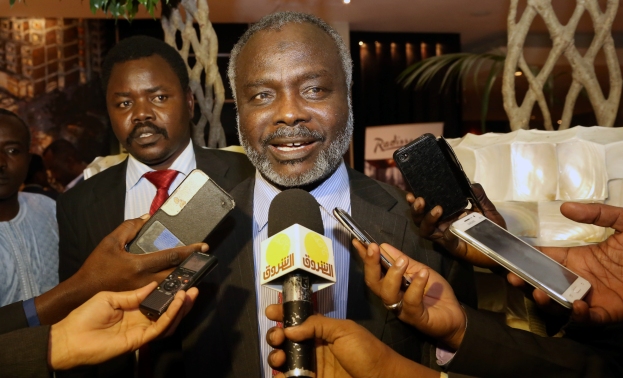JEM warns African Peace Council against taking sides in Darfur conflict

March 2, 2018 (KHARTOUM) – The Justice and Equality Movement (JEM) led by Gibril Ibrahim has warned the African Union Peace and Security Council (AUPSC) against the consequences of siding with one of the parties to the conflict in Darfur.
In a meeting held on 20 February 2018, the AUPSC said concerned by the “unnecessarily prolonged” process for peace in Darfur and called for a rapid resolution of the 15-year conflict.
The Council further pointed to “the lack of commitment on the part of the non-signatory Darfur armed movements” and urged them to engage discussions with the government on the basis of the Doha Document for peace in Darfur (DDPD).
It urged mediators to make progress in the resolution of Darfur conflict during the upcoming three months and threatened to sanction those who continue to hinder the ongoing efforts for a lasting peace.
In a statement extended to Sudan Tribune Friday, JEM leader Gibril Ibrahim denied that his Movement or the Sudan Liberation Movement (SLM-MM) led by Minni Minnawi are hampering the peace process.
Instead, he accused the Sudanese government of hindering the peace process.
“ The Movements have remained fully committed to the peace process and have been the ones who have been regularly coming up with initiatives and making concession after concession to help the process move forward. Meanwhile, the GoS has only a military solution to the conflict to offer. JEM and SLM-MM have not declined any invitation by the Mediation to come to the table to talk peace,” read the statement.
“In fact, at this very moment in which I am writing these comments, our delegation is in meetings with the Mediation in Addis,” he further disclosed without elaborating on the purpose of the meeting or the members of the delegation.
Last January the opposition groups declined a call by the mediation to discuss the future of a roadmap signed in 2016 in order to resume political talks for peace in Sudan within the framework of two tracks to end the armed conflicts in Darfur and the Two Areas.
Referring to their rejection to engage negotiations on the basis of the Doha Document for Peace in Darfur (DDPD), Ibrahim said the government want them to sign a document they didn’t negotiate and then to discuss the future of their forces and the jobs they may ask for.
He further added they believe that the framework agreement, which is signed in July 2011 in Doha, does not fulfil the requirements of lasting peace in Darfur.
“Moreover, the Movements do not agree that the DDPD alone is capable of bringing lasting peace to Darfur, and they seek to resolve the root causes of the conflict through a comprehensive and objective approach,” he stressed.
In August 2016, JEM and SLM-MM failed to sign a humanitarian cessation of hostilities with the government as they diverged with the government on the release of the prisoners of war, the fighters location and humanitarian mechanisms.
In his comments, the rebel leader spoke for the first time about the status of the mediation.
“For the peace process to move forward and produce results, it needs a full-time mediator with a dedicated and experienced staff. While the Joint Special Representative (JSR) of UNAMID has been a critical actor in Darfur, the asking of the JSR to be the Joint Chief Mediator (JCM) was an unfortunate mistake for two major reasons,” he said.
He further said the UNAMID chief cannot be a fair mediator because he has to work closely with the government according to the Status of the Forces Agreement (SOFA) between UNAMID and the Government signed in 2008.
Ibrahim didn’t speak about the African-Union High-Level Implementation Panel (AUHIP) which now mediating the talks as the role of the UNAMID head is limited to the facilitation of the process.
Before 2011, there was a separation between the joint chief mediator and the UNAMID head but the then JSR Ibrahim Gambari took the job in July 2011 after the resignation of the chief mediator Djibril Bassole who had been criticised by the AUPSC for neglecting the conclusions of a report by Thabo Mbeki about the need for a comprehensive process for the whole Sudan.
The African Union mediation panel (AUHIP) led by former South African President Thabo Mbeki proposed a holistic process to end the armed conflicts and produce political reforms in Sudan.
During the year 2015-2016, talks between the government and the SLM-MM and JEM failed to reach a tangible result despite international efforts to bring together the opposition groups and to narrow the gaps between them and the government.
(ST)
